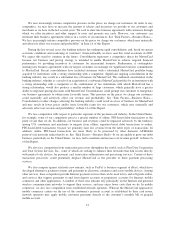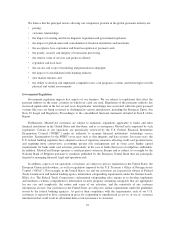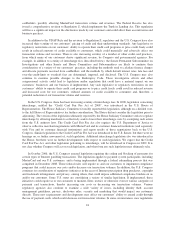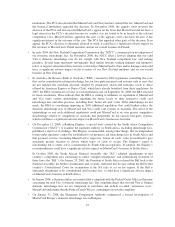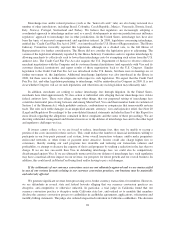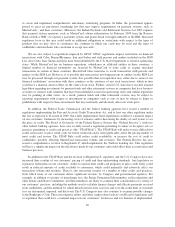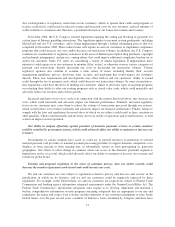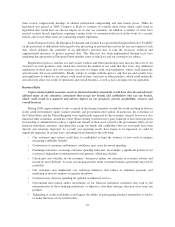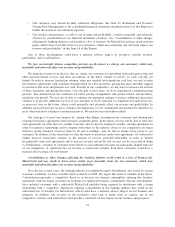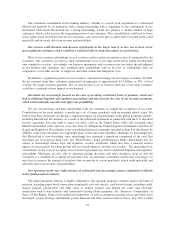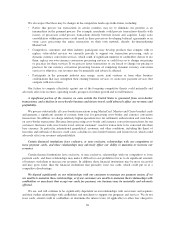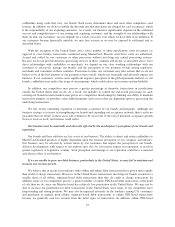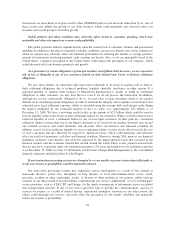MasterCard 2008 Annual Report Download - page 41
Download and view the complete annual report
Please find page 41 of the 2008 MasterCard annual report below. You can navigate through the pages in the report by either clicking on the pages listed below, or by using the keyword search tool below to find specific information within the annual report.Any such legislative or regulatory restrictions on our customers’ ability to operate their credit card programs or
to price credit freely could result in reduced revenue and increased costs for our customers, reduced amounts of
credit available to consumers and, therefore, a potential reduction of our transaction volume and revenues.
In October 2006, the U.S. Congress enacted legislation requiring the coding and blocking of payments for
certain types of Internet gambling transactions. The legislation applies to payment system participants, including
MasterCard and our U.S. customers, and is being implemented through a federal rulemaking process that was
completed in December 2008. These federal rules will require us and our customers to implement compliance
programs that could increase our costs and/or decrease our transaction volumes. In addition, the U.S. Congress
continues its consideration of regulatory initiatives in the areas of Internet prescription drug purchases, copyright
and trademark infringement, and privacy, among others, that could impose additional compliance burdens on us
and/or our customers. Some U.S. states are considering a variety of similar legislation. If implemented, these
initiatives could require us or our customers to monitor, filter, restrict, or otherwise oversee various categories of
payment card transactions, thereby increasing our costs or decreasing our transaction volumes. Various
regulatory agencies also continue to examine a wide variety of issues, including identity theft, account
management guidelines, privacy, disclosure rules, security, and marketing that would impact our customers
directly. These new requirements and developments may affect both us and our customers’ ability to extend
credit through the use of payment cards, which could decrease our transaction volumes. In some circumstances,
new regulations could have the effect of limiting our customers’ ability to offer new types of payment programs
or restricting their ability to offer our existing programs such as stored value cards, which could materially and
adversely reduce our revenues and revenue growth.
Increased regulatory focus on us, such as in connection with the matters discussed above, may increase our
costs, which could materially and adversely impact our financial performance. Similarly, increased regulatory
focus on our customers may cause them to reduce the volume of transactions processed through our systems,
which would reduce our revenues materially and adversely impact our financial performance. Finally, failure to
comply with the laws and regulations discussed above to which we are subject could result in fines, sanctions or
other penalties, which could materially and adversely affect our results of operations and overall business, as well
as have an impact on our reputation.
Our ability to compete effectively against providers of domestic payments services in certain countries
could be curtailed by government actions, which could adversely affect our ability to maintain or increase our
revenues.
Governments in certain countries have acted, or could act, to provide resources or protection to selected
national payment card providers or national payment processing providers to support domestic competitors or to
displace us from, prevent us from entering into, or substantially restrict us from participating in, particular
geographies. Our efforts to effect change in countries where our access to the domestic payments segment is
limited may not be successful, which could adversely affect our ability to maintain or increase our revenues and
extend our global brand.
Existing and proposed regulation in the areas of consumer privacy, data use and/or security could
decrease the number of payment cards issued and could increase our costs.
We and our customers are also subject to regulations related to privacy and data use and security in the
jurisdictions in which we do business, and we and our customers could be negatively impacted by these
regulations. For example, in the United States, we and our customers are respectively subject to Federal Trade
Commission and banking agency information safeguard requirements under the Gramm-Leach-Bliley Act. The
Federal Trade Commission’s information safeguards rules require us to develop, implement and maintain a
written, comprehensive information security program containing safeguards that are appropriate to our size and
complexity, the nature and scope of our activities and the sensitivity of any customer information at issue. In the
United States, over the past several years a number of bills have been considered by Congress and there have
31


